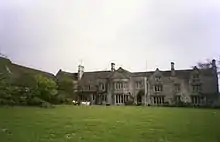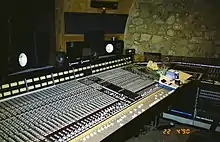The Manor Studio
The Manor Studio (a.k.a. The Manor) was a recording studio in the manor house at the village of Shipton-on-Cherwell in Oxfordshire, England, north of the city of Oxford.

Overview
The Manor and its outbuildings are listed Grade II on the National Heritage List for England.[1]
The Manor was the third residential recording studio in the United Kingdom. The first being Ascot Sound Studios built between 1970-1971 by John Lennon in an addition to his Tittenhurst Park mansion, where he recorded his Imagine album. The second being Rockfield Studios in Monmouthshire. The concept was pioneered in 1969 by French musician Michel Magne in the Château d'Hérouville.
The manor house was owned by Richard Branson and used as a recording studio for Virgin Records, although artists signed to other labels also used the studios.
The first officially released album to be recorded there, while the studio was still being given its finishing touches in late 1971, was Let's Make Up And Be Friendly, a farewell reunion album by members of the Bonzo Dog Band. The most famous album to be recorded there was perhaps Tubular Bells by Mike Oldfield, during 1972–73 when Oldfield was given a week to record an LP at the studio. Vivian Stanshall, formerly of the Bonzo Dog Band, was recording his own first solo album there immediately afterwards, which led to his guest role as Master Of Ceremonies on Tubular Bells.[2] Sandy Denny also began her second solo album Sandy there in March 1972.
In April 1995, after the takeover of Virgin Records by EMI, The Manor Studio was closed as a recording studio by EMI. It is now the country home of the Marquess of Headfort.
In 2010, NME reported that the Manor was up for sale for £5.75 million.[3]
Studio facilities

The facilities were advertised as follows, as of 1973:[4]
|
|
Partial list of albums recorded at The Manor
- Let's Make Up and Be Friendly (1971–72) – The Bonzo Dog Band – the first band to use the studio, in November 1971
- Rock On (December 1971) – The Bunch featuring Sandy Denny, Richard Thompson, Trevor Lucas and others.
- Sandy (1972) – Sandy Denny
- Trouble at Mill (March 1972) – King Earl Boogie Band
- Two Weeks Last Summer (April 1972) – Dave Cousins
- The Academy in Peril (1972) – John Cale
- Mekanïk Destruktïw Kommandöh (1972–73) – Magma
- Flying Teapot (1972–73) – Gong
- Tubular Bells (September 1972 – March 1973) – Mike Oldfield
- Men Opening Umbrellas Ahead (1973) – Vivian Stanshall
- Double Diamond (1973) – If
- Legend (May 1973) – Henry Cow
- Castle in Spain (June 1973) – CCC Inc.
- Faust IV (June 1973) – Faust
- Spring Suite (July 1973) – McKendree Spring
- October (1973) – Claire Hamill
- Phaedra (December 1973) – Tangerine Dream
- Dandruff (1974) – Ivor Cutler
- You (1974) – Gong
- Unrest (February–March 1974) – Henry Cow
- Blame It on the Night (1974) – Kevin Coyne
- Ghosts (July–September 1974) – Strawbs
- Slapp Happy (1974) – Slapp Happy
- Desperate Straights (1975) – Slapp Happy/Henry Cow
- In Praise of Learning (1975) – Henry Cow/Slapp Happy
- Fine Old Tom (1975) – Tom Newman
- Local Lads Make Good (1975) – Supercharge
- Rubycon (1975) – Tangerine Dream
- Ricochet (1975) – Tangerine Dream
- Deep Cuts (spring–summer 1976) – Strawbs
- Bloodletting (1976) – Boxer
- A Day at the Races (1976) – Queen – backing tracks
- A Period of Transition (1976) – Van Morrison
- White Music (October 1977) – XTC
- Wavelength (1978) – Van Morrison
- Manorisms (1978) – Wet Willie
- Gene Simmons (April 1978) – Gene Simmons
- Una donna per amico (1978) - Lucio Battisti
- Frenzy (November–December 1978) – Split Enz
- Metal Box (June–July 1979) – Public Image Ltd
- Present Tense (July–August 1979) – Shoes
- Metro Music (August 1979) – Martha and the Muffins
- Towers of London (July 1980) – XTC
- The Flowers of Romance (October 1980) – Public Image Ltd
- Strada facendo (1980–81) – Claudio Baglioni
- The Nature of the Beast (1981) – April Wine
- La Folie (July–September 1981) – The Stranglers
- English Settlement (October–November 1981) – XTC
- All Fall Down (March 1982) – The Sound
- Mummer (September–December 1982) – XTC
- The Crossing (1983) – Big Country
- Head First (January–March 1983) – Uriah Heep
- Born Again (mid-1983) – Black Sabbath
- The Swing (1984) – INXS
- Concert: The Cure Live (1984) – The Cure
- La vita è adesso (1985) – Claudio Baglioni
- Power Windows (1985) – Rush
- Peace (Summer 1986) – The Cult
- Gone to Earth (September 1986) – David Sylvian
- Wild in the Streets (1987) – Helix
- Hold Your Fire (1987) – Rush
- All About Eve (Summer 1987) – All About Eve
- Once Around the World (1987) – It Bites
- Thunder and Consolation (1988) – New Model Army
- Trash the Planet (1989) – Spy vs Spy
- Wish (September 1991 – February 1992) – The Cure
- The Ethereal Mirror (1993) – Cathedral
- Gold Against the Soul (1993) – Manic Street Preachers
- Wild Wood (1993) – Paul Weller
- Grand Prix (September–October 1994) – Teenage Fanclub
- Carnival of Light (1994) – Ride
- No Need to Argue (1994) – The Cranberries
- The Bends (1995) – Radiohead
- Stanley Road (1995) – Paul Weller
- All Change (1995) – Cast – the last band to record at the studio
References
- Historic England, "The Manor and attached outbuildings (1290378)", National Heritage List for England, retrieved 2 December 2016
- "Tubular Bells (M. Oldfield)". Iankitching.me.uk. Retrieved 4 December 2012.
- "'Tubular Bells' studio up for sale | News". Nme.Com. 6 June 2010. Retrieved 4 December 2012.
- Notes in 25th Anniversary Edition of Tubular Bells, 1998.